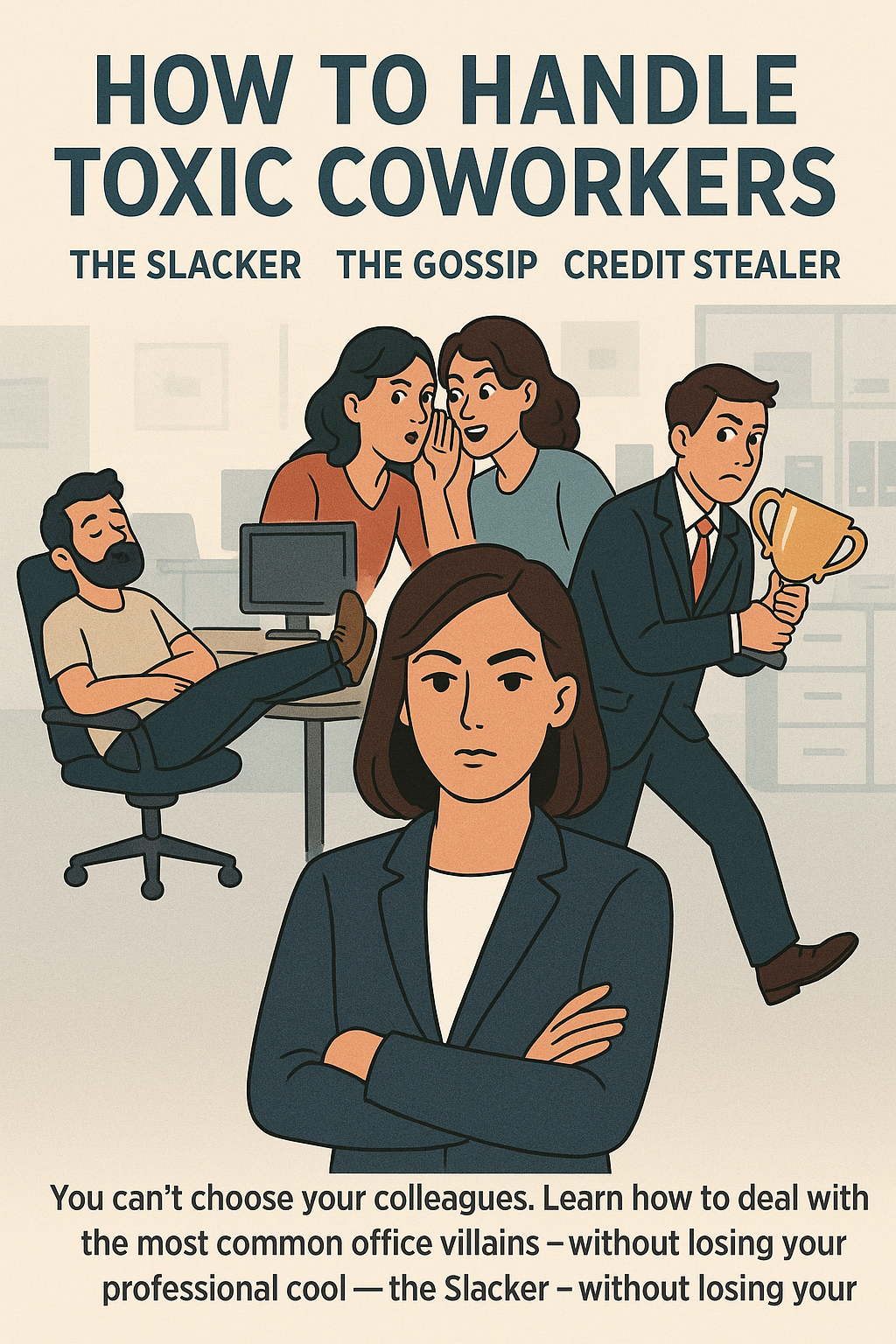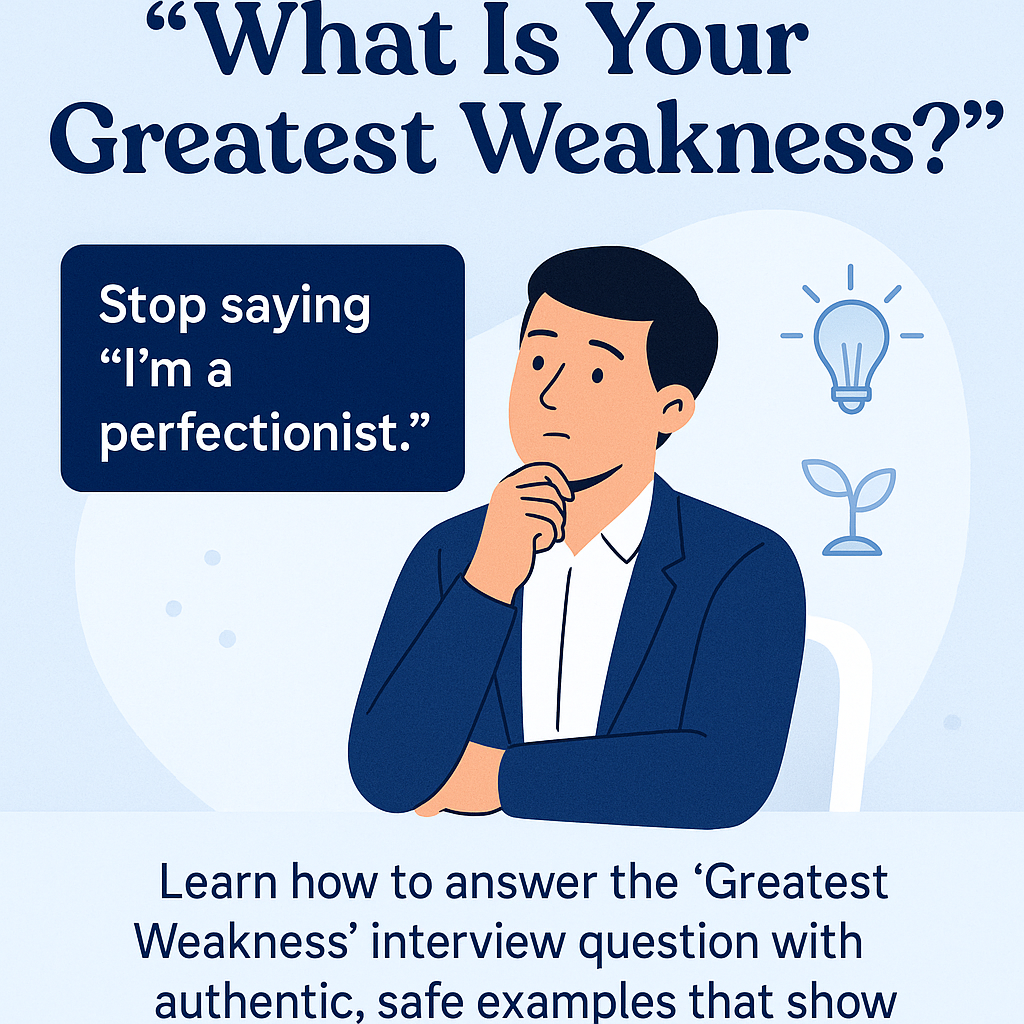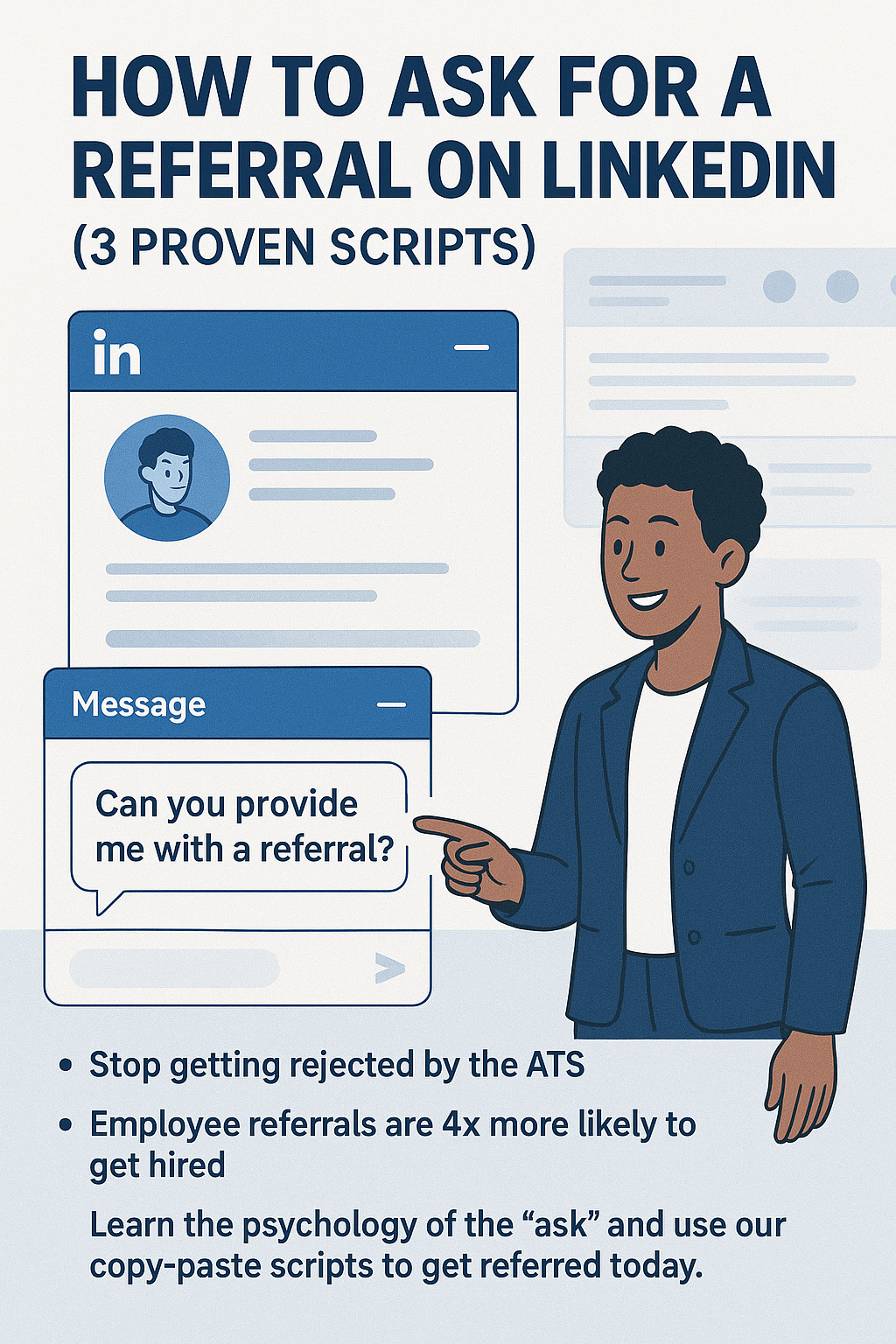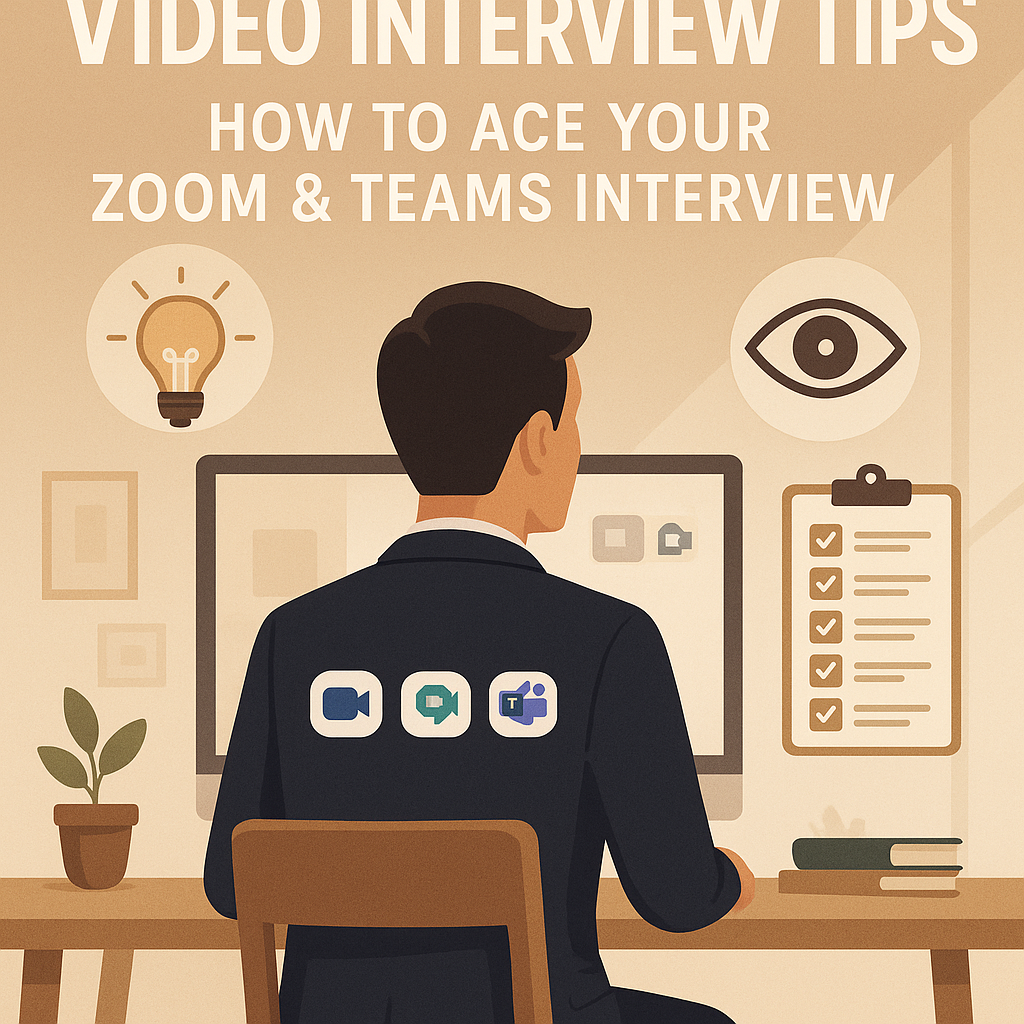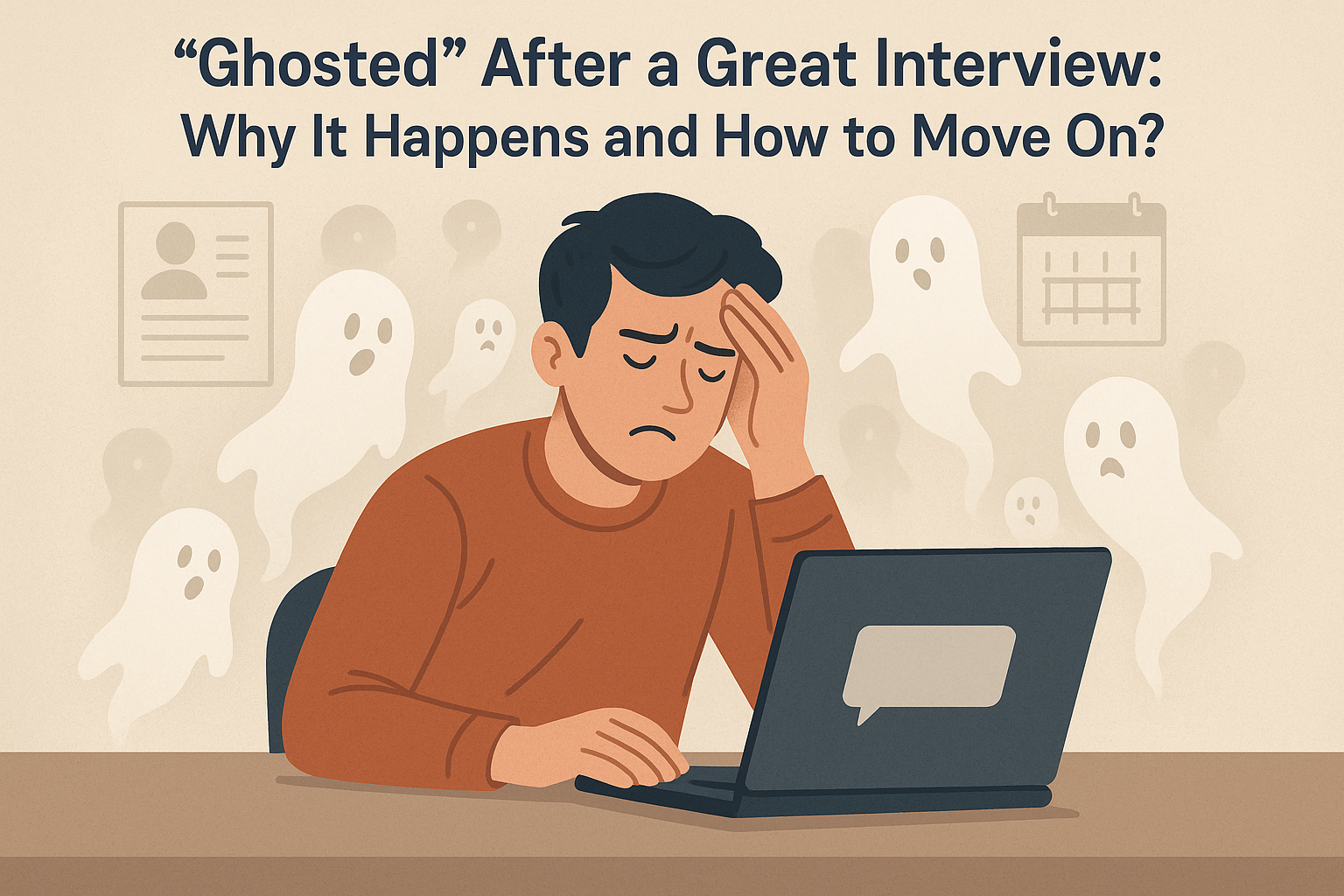
"Ghosted" After a Great Interview: Why It Happens and How to Move On?
The feeling is unmistakable. You walk out of the interview room (or log off the video call) with a surge of adrenaline and optimism. The conversation flowed effortlessly. You built a genuine rapport with the hiring manager, answered every question with confidence, and even shared a laugh. They ended with those magic words: "This was great. We're very impressed and will be in touch very soon."
You spend the next few days on cloud nine. You draft thank-you emails, tell your family it went well, and start imagining your first day. You check your phone compulsively, your heart leaping at every new email notification.
But then, "very soon" turns into a week. Then ten days. Your follow-up email is met with silence. The recruiter who was so responsive before has suddenly gone quiet. And then the cold, frustrating realization dawns on you: you've been ghosted.
Being ghosted after a great interview is one of the most confusing and demoralizing experiences in the modern job search. It feels unprofessional and disrespectful, and it can leave you questioning your skills, your performance, and your sanity. You start replaying every second of the interview in your head, searching for the one tiny mistake you must have made. Did I say something wrong? Was my answer to that one question not good enough? The self-doubt can be overwhelming.
If this has happened to you, know this: you are not alone, and it is almost never your fault. This phenomenon has become an unfortunate but common part of the modern hiring landscape. The silence that feels so personal is rarely a reflection of you as a candidate. It's almost always a symptom of internal processes, politics, or simple human error within the company. Depersonalizing the experience is the first and most crucial step to moving on. This guide will pull back the curtain on why ghosting happens so often and provide a professional, empowering framework for how to handle it and move forward with your confidence intact.
Why Does Ghosting Happen? It’s (Almost) Never About You.
The silence that feels like a personal indictment of your abilities is, in reality, a logistical or strategic issue on the company's end. Understanding the real reasons can help you detach emotionally and see the situation with professional clarity.
The Most Common Culprit: Internal Chaos & Shifting Priorities
A company is a dynamic, often chaotic entity. While you were interviewing, any number of internal events could have occurred that had absolutely nothing to do with you. * The Role Was Put on Hold or Canceled: This is the number one reason. Due to a sudden budget freeze, a shift in corporate strategy, or a quarterly review, the finance department put an indefinite hold on all new hiring for that team. The role you interviewed for may no longer even exist, but the recruiter is too overwhelmed or doesn't have a clear message to communicate this to all the candidates. * An Internal Candidate Was Chosen: This happens all the time. A strong internal employee, who is a known quantity and requires less onboarding, applied for the role at the last minute or was promoted into the position. This is often the preferred, lowest-risk hiring path for companies, making the external search redundant. * The Team Was Restructured: A departmental re-organization happened. The role you interviewed for might now report to a different manager, have a different set of responsibilities, or have been absorbed by another team entirely. The hiring process is paused until the dust settles. * The Hiring Manager Left: The person you interviewed with and who was your biggest champion might have resigned, been moved to another project, or gone on an unexpected long-term leave. Without a clear decision-maker, your candidacy is left in limbo.
The Overwhelmed Recruiter
Imagine a corporate recruiter's inbox. They are often juggling 20, 30, or even more open roles simultaneously. For each of those roles, they might be tracking dozens of candidates at various stages—sourcing, screening, multiple interview rounds, and offers. While it is absolutely their professional duty to communicate with every candidate, the sheer volume of work can be immense. Your follow-up email might be one of 300 they receive that day. In this deluge, providing personalized feedback to every unsuccessful candidate, especially when the reason for the "no" is a messy internal one, unfortunately becomes a low-priority task that falls through the cracks. It's not a good excuse, but it's often the reality.
Fear of Awkward Conversations or Legalities
Delivering bad news is uncomfortable. Some recruiters or hiring managers are non-confrontational and find it easier to say nothing than to craft dozens of rejection emails, especially if you were a strong finalist. In some global corporations, there's also a (sometimes misguided) fear that providing specific feedback could lead to legal challenges or arguments from candidates. As a result, the default, "safe" corporate policy becomes "say nothing at all." It’s poor practice and a bad candidate experience, but it’s a common corporate defense mechanism.
A Last-Minute "Unicorn" Candidate Appeared
The hiring process can be unpredictable. You might have been the top choice, and an offer letter was being drafted. But at the eleventh hour, a "unicorn" candidate appeared—perhaps a direct referral from the CEO, a former star employee wanting to return, or someone with an incredibly niche and perfect skill set that they couldn't pass up. The company made a swift decision to hire that person, and in the rush to onboard their new hire, the professional courtesy of informing the other finalists was unfortunately forgotten.
The Professional Follow-Up: A 2-Step Strategy for Closure
While you can't control their process, you can control your response. A calm, professional follow-up strategy shows your professionalism, helps you get the closure you need to move on, and leaves the door open for future opportunities.
Step 1: The Gentle Nudge (Wait 7-10 Business Days)
First, honor the timeline they gave you. If they said "early next week," wait until at least Wednesday. If they gave no specific timeline, waiting a week to ten business days is a professional standard. Then, send a polite and concise email. This is not a demand for an answer; it is a gentle reminder.
Template 1: The Gentle Nudge
Subject: Following Up on the [Job Title] Interview
Hi [Recruiter's Name],
Hope you're having a great week.
I'm writing to follow up on my interview on [Date] for the [Job Title] position. I truly enjoyed learning more about the role from [Hiring Manager's Name] and remain very enthusiastic about the opportunity to contribute to your team.
Could you please let me know if there are any updates on the timeline for the next steps?
Best regards, [Your Name]
This email is perfect. It’s professional, jogs their memory, reiterates your interest, and doesn't sound demanding or desperate.
Step 2: The Closing Loop (Wait Another 5-7 Business Days)
If you receive no response to your first email, send one final email about a week later. The goal of this message is not to get the job; it's to professionally close the communication loop on your end and leave a positive, lasting impression. You are demonstrating that you are moving on, but are still open to future possibilities.
Template 2: The Closing Loop
Subject: Checking in on the [Job Title] Role
Hi [Recruiter's Name],
I hope this email finds you well. I'm just checking in one last time regarding the [Job Title] position I interviewed for on [Date].
I assume the role has likely been filled or your team's priorities have shifted, and I completely understand. I wish you and the team all the best. I have a great deal of respect for the work [Company Name] is doing, and I hope we can stay connected for any future opportunities that might be a better fit.
Sincerely, [Your Name]
After this email, your work is done. Do not send any more follow-ups. Do not call them. Pestering a recruiter will only burn a professional bridge and harm your reputation. The silence is now your answer, and it's time to fully redirect your energy elsewhere.
The Mindset Shift: How to Move On and Protect Your Confidence
The most important work happens in your own mind. Here’s how to process the experience and come out stronger.
- Depersonalize and Reframe: Constantly remind yourself of the many internal reasons why ghosting happens. Consciously reframe the narrative in your head from "I wasn't good enough" to "Their circumstances must have changed." This shifts the focus from your perceived flaws to their logistical issues, which is a much healthier and more accurate perspective.
- Allow Yourself to Be Disappointed (Briefly): It’s okay to feel let down, especially if you were genuinely excited about the role. Acknowledge the frustration. Give yourself a day to vent or feel sad. Then, make a conscious decision to channel that energy back into your search.
- Conduct Your Own Post-Interview Analysis: You may never get feedback from them, but you can get it from yourself. What parts of the interview went exceptionally well? Which questions did you struggle with? Use every interview—successful or not—as valuable data to improve your performance for the next one. This is a great time to revisit an interview questions resource to practice the answers you felt were weak.
- Never Stop the Momentum: The single biggest mistake job seekers make is pausing their entire search while they wait to hear back from a "promising" company. This creates an unhealthy emotional investment in a single outcome. The golden rule is this: Keep applying and keep interviewing until you have a signed offer letter in your hand. This emotional diversification is the best shield against disappointment. A great way to keep the pipeline full is to have automated job alerts sending new, relevant opportunities directly to your inbox.
- Remember Your Value: One company's silence is not a verdict on your skills, your experience, or your worth as a professional. Their lack of response is a data point about their culture and internal processes, not about you. It might even be a blessing in disguise, saving you from joining a disorganized or poorly managed company. Your value is constant, and the right opportunity at a company that respects its candidates is still out there. A powerful way to reaffirm your value is to review your resume, which you've hopefully perfected with a tool like the JobPe Resume Builder, and remind yourself of all your past accomplishments.
Conclusion: Your Power Lies in Your Response
Being ghosted is a frustrating and unprofessional reality of the modern job search. But ultimately, it is a reflection of the company, not of you.
You cannot control their communication, but you have absolute control over your reaction. By handling the situation with grace and professionalism, by refusing to let it damage your confidence, and by relentlessly moving forward in your search, you turn a negative experience into fuel for your journey.
The right company will not only see your value—they will respect you enough to communicate it.
For more resources to help you at every stage of your job search, https://jobpe.com.

Creative Content Writer


